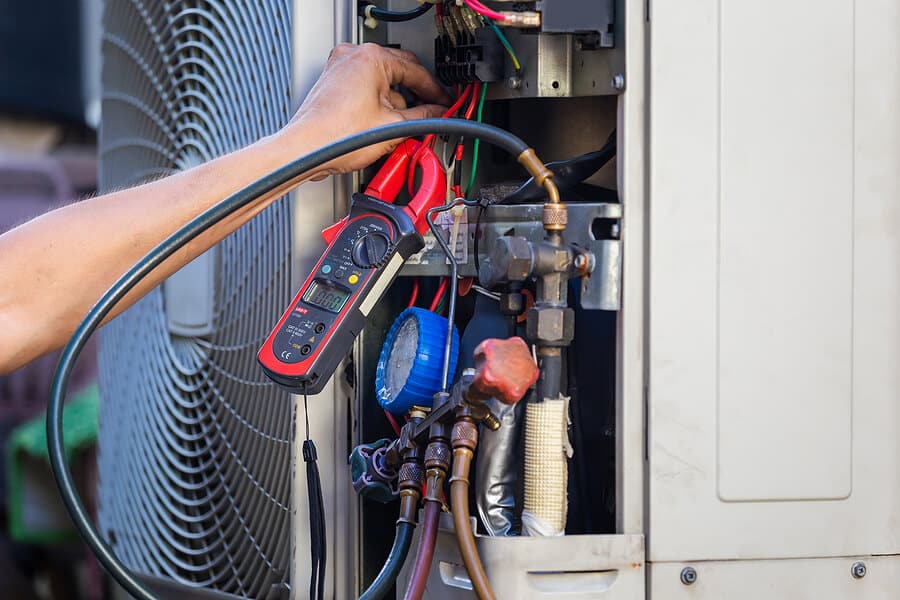Energy-Efficient HVAC Systems to Save Money On Energy Costs
As energy expenses continue to rise, the importance of energy-efficient HVAC systems ends up being significantly noticeable. These systems not just guarantee considerable financial savings on utility expenses but also contribute to a much more lasting future by lessening energy consumption. With various choices readily available, including geothermal heatpump and ductless mini-splits, homeowner encounter a wide variety of choices that can boost comfort and air high quality. Comprehending the crucial features and maintenance needs is essential to taking full advantage of these advantages. What factors should be focused on when choosing the ideal system for your requirements?
Advantages of Energy-Efficient Heating And Cooling Systems
Energy-efficient HVAC systems offer many advantages that expand beyond plain price financial savings. By eating less power, these systems add to lower greenhouse gas discharges, assisting to combat environment modification and promote sustainability.
In addition, energy-efficient cooling and heating systems frequently supply enhanced convenience degrees. Most of these systems feature advanced modern technology that permits much better temperature control and boosted air quality (DMAKS HVAC). This causes a much healthier interior setting, which is particularly crucial for individuals with allergies or respiratory problems
Additionally, purchasing energy-efficient a/c systems can improve residential or commercial property value. As more consumers prioritize power performance, homes and structures equipped with these systems might draw in greater proposals in the actual estate market.
Sorts Of Energy-Efficient Heating And Cooling Options
How can home owners and companies select one of the most suitable energy-efficient cooling and heating choices for their demands? The marketplace offers a range of energy-efficient heating and cooling systems, each created to boost comfort while minimizing power consumption.
One option is the variable refrigerant flow (VRF) system, which efficiently controls the temperature in several zones within a building. This system adjusts its cooling agent flow to match the desired temperature, leading to significant energy financial savings.
An additional popular choice is geothermal heat pumps, which use the planet's secure temperature to warmth and cool rooms. By moving heat to and from the ground, these systems show outstanding effectiveness, especially in modest climates.
In addition, ductless mini-split systems give an energy-efficient choice for homes lacking ductwork. These systems permit zone-specific cooling and heating, reducing power waste in empty areas.
Last but not least, high-efficiency heating systems and ac unit, with advanced SEER and AFUE scores, use reliable climate control while taking in less power than typical versions. By evaluating these choices, house owners and companies can pick a heating and cooling system tailored to their specific needs and energy performance goals.
Trick Features to Think About

Following, check out the kind of compressor used in the system. DMAKS HVAC. Variable-speed compressors can readjust their outcome to match the heating or cooling need, bring about boosted comfort and power financial savings compared to single-speed designs. Furthermore, seek systems furnished with clever thermostats that provide programmable setups and remote access, permitting for better control over power consumption
An additional crucial feature is the system's air filtering ability. High-efficiency filters can enhance interior air quality and decrease energy consumption by guaranteeing the system operates successfully. Consider the type of refrigerant made use of; contemporary systems typically use environment-friendly refrigerants that have a reduced environmental influence.
Last but not least, make sure that the system is suitable with zoning innovation, which enables customized temperature level control in different areas of your home, boosting comfort while reducing energy use.
Tips for Choosing the Right System


Following, take into consideration power effectiveness rankings, particularly the Seasonal Power Effectiveness Ratio (SEER) for cooling down systems and the Annual Fuel Utilization Performance (AFUE) for heater. Higher ratings show better performance, which can result in significant financial savings on energy expenses in time.
Additionally, review the sort of a/c system that best fits your lifestyle and spending plan. Choices include main air conditioning, ductless mini-splits, and heat pumps, each with its own set of benefits and downsides.
Don't ignore the significance of correct setup and sizing; an improperly sized system can lead to inefficiencies and boosted wear. Consult with a specialist A/c contractor to get experienced suggestions customized to your home's unique demands. This comprehensive technique will make sure that you pick an energy-efficient HVAC system that satisfies your demands and budget properly.
Maintenance for Ideal Effectiveness
As soon as the right HVAC system remains in area, ongoing maintenance comes to be crucial to making sure ideal performance and long life. A well-maintained system runs much more successfully, causing reduced power consumption and reduced utility bills. Routine assessments and tune-ups must be set up a minimum of twice a year-- as soon as prior to the air conditioning period and when before the heating period.

Homeowners must likewise be vigilant concerning checking their HVAC system's efficiency. Unusual sounds, fluctuating temperature levels, or increased energy costs can show underlying problems that require prompt attention. By attending to these concerns promptly, home owners can avoid expensive fixings and prolong the lifespan of their systems.
Spending in an upkeep plan with a qualified service technician not just improves efficiency however likewise gives assurance, knowing that the system is operating at its finest. DMAKS HVAC. Normal maintenance is consequently essential for maintaining energy efficiency and minimizing total functional expenses
Verdict
To conclude, energy-efficient heating and cooling systems provide a feasible option for reducing utility costs while boosting convenience and air top quality. By including other advanced technologies and options such as geothermal heatpump and ductless mini-splits, homeowner can achieve considerable energy cost savings and add to ecological sustainability. Careful consideration of system attributes and recurring maintenance even more makes sure ideal performance, making energy-efficient systems a prudent investment for both economic and ecological benefits.